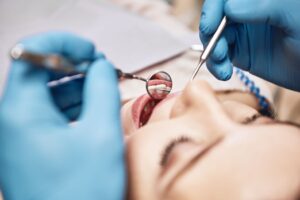 Seemingly everyone wishes they had a flawless smile, though few people naturally have one. While some patients only require simple enhancements, others have issues needing more complex treatments to resolve. If you have one or more imperfections, you need to address, like stubborn discoloration, physical damage, crooked and overcrowded teeth, or gaps in your grin, you might require a full mouth reconstruction to restore your appearance.
Seemingly everyone wishes they had a flawless smile, though few people naturally have one. While some patients only require simple enhancements, others have issues needing more complex treatments to resolve. If you have one or more imperfections, you need to address, like stubborn discoloration, physical damage, crooked and overcrowded teeth, or gaps in your grin, you might require a full mouth reconstruction to restore your appearance.
With this approach, you and your dentist will use one or more cosmetic or restorative treatments to achieve your desired results. However, many patients avoid getting work done because they’re worried about recovery. Continue reading to learn more about healing from a full mouth reconstruction so you can set your mind at ease!
What Is a Full Mouth Reconstruction
A full mouth reconstruction refers to one or several services applied to rebuild or replace your teeth, gums, and jaw to preserve your smile’s appearance and functionality. The details vary from person to person because they are based on your unique goals and dental condition.
Before you can proceed, you must schedule a consultation with your dentist. They’ll examine your mouth and discuss any areas of concern with you, then provide an individualized treatment plan that can include as many services as are required to reach the end goal, which might include:
- Porcelain veneers
- Dental crowns, bridges, or implants
- Onlays
- Gum grafts
- Bone grafts
- Additional cosmetic procedures
What Happens During Full Mouth Reconstruction Recovery?
The healing process is determined by the different treatments you undergo, and some have longer recovery periods than others. For instance, if you’re getting veneers, you might have some slight sensitivity once they’re placed, but it typically dissipates in one to two weeks. There’s usually no bleeding or swelling because it’s a minimally invasive procedure.
Other solutions, like dental crowns, can cause soreness and inflammation for a few days, but symptoms can often be effectively addressed with over-the-counter pain medications. Depending on the procedure, you might also have a tough time chewing, so you may want to stick to softer foods that are easier to chew.
If you’re unsure what to anticipate as you heal, the best way to find out is to ask your dentist. At your consultation, they’ll take the time to walk you through the details of any procedures they recommend. This is also the ideal time to ask pertinent questions about timelines, preparation, and any special post-op instructions that might apply.
About the Practice
At Windermere Dentistry, you benefit from two skilled dentists who provide a full range of services at one convenient location. With 20+ years of combined experience, they can handle everything from basic preventative care to complete mouth reconstructions. They take the time to learn about your unique concerns and goals and then create customized treatment plans to meet them. Then, they utilize state-of-the-art equipment to enhance your comfort while delivering accurate, long-lasting results. If you’re ready to upgrade your grin, you can request a consultation on the website or call (407) 258-1330.
